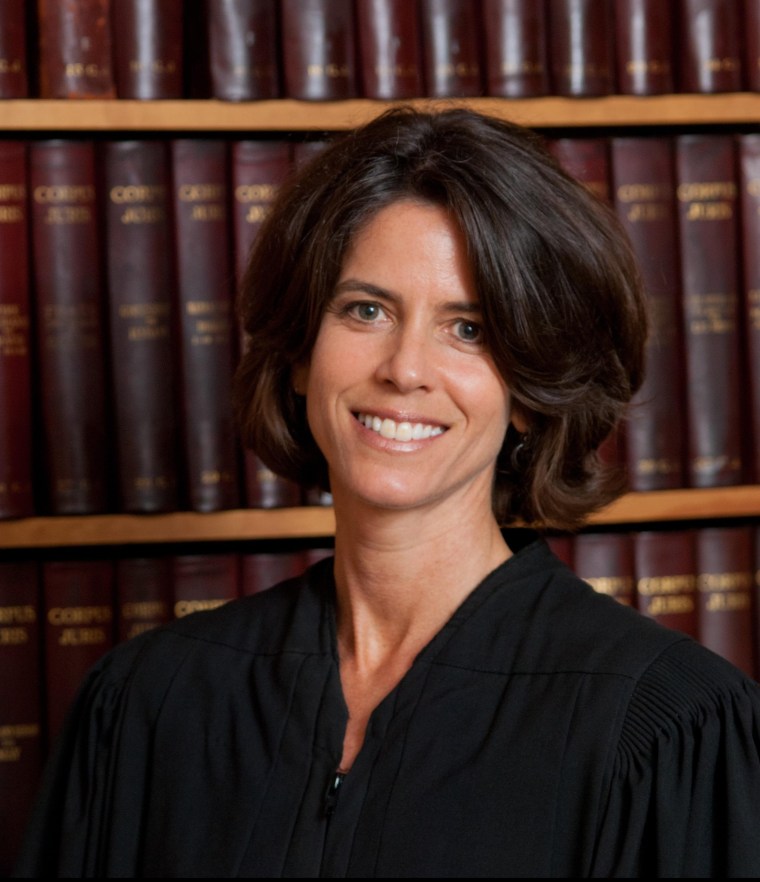
MANCHESTER, NH – New Hampshire courts are taking extra measures – from providing clear masks for witnesses testifying to portable carbon monoxide monitors – to ensure fair trials and the safety of everyone entering a courtroom during the COVID-19 pandemic.
Tina L. Nadeau, chief justice of the New Hampshire Superior Court, in a WebEx discussion with the media on Thursday said the state contracted with Dr. Erin Bromage, associate professor in biology at the College of Arts & Sciences at UMASS Dartmouth, to implement procedures to ensure everyone who enters a courthouse is safe.
The task is even more important now with the resumption of jury trials in superior courts, where some ventilation systems are top-notch while those in older structures are not.
Bromage, she said, provided advice on how to operate safely. Looking at the ventilation systems, she said, helps determine how many people can be safely in a courthouse.
That’s where the carbon monoxide monitors come into play. “You can’t measure the virus but you can measure the breath and when it reaches too high a level, you take a break and people will go to their cars and wait for the levels to go back down,” Nadeau said in explaining how the monitors are used. “So we have installed those in four of the superior courthouses and will probably be using them elsewhere. It gives you another level of confidence coming into the courthouse.”
Social distancing is being adhered to and both jurors and grand jurors are all being issued surgical masks. They must wear them at all times except when eating but even then they are told not to talk because “talking produces aerosols in the air,” she said.
Nadeau said she tours every courthouse before a jury is up and running to ensure it is set up safely.
“We’ve had a very good response from jurors,” she said. “They tell us they feel safe and are happy how the proceedings have gone.”
Witnesses are wearing clear masks when testifying, she said, so jurors can see their demeanor and not compromise due process in any way.
“It is difficult to balance but I think the jurors and grand jurors have felt very safe,” Nadeau said.
To ensure a jury is seated, more people were summoned for jury duty. With the summons comes a letter from Nadeau explaining what procedures are in place to ensure their safety during the pandemic and so they will feel comfortable entering a courthouse.
Nadeau said she was concerned that there would be numerous requests to be excused from jury duty because of COVID-19. She handled all the requests, to ensure consistency, but said while there were some requests not as many as she expected. Those asking to be excused included people over the age of 64, people with asthma and individuals taking care of someone with a compromised immune system. Since the initial round of jury summons, she said, there has been the usual requests to be excused, such as because of financial hardship.
Grand juries are back to their usual monthly sessions with only two counties – Grafton and Coos – holding theirs in a central location in Concord because their facilities are not large enough to accommodate a grand jury.
The courts also are making sure that a grand jury and a jury trial are not held simultaneously in a courthouse, again to ensure everyone is safe.
She said it is unlikely that jury trials will take place anytime soon in Sullivan County because of the courthouse’s poor ventilation system. That could change if they are able to improve the ventilation system or there is a vaccine, she said.
While the courts are open, the public has limited access to them. Kiosks allowing access to court files are closed. However, Nadeau said the courts have held more than 13,000 WebEx hearings since access was limited and held 500 in-person hearings.
She said there isn’t a backlog of cases “per se.” She explained that now that cases are being scheduled for status and dispositional conferences as well as for trials, many are being resolved.
“Criminal cases are resolved by a plea 95 to 98 percent of the time,” she said.
Cases are on track to be heard, she said, some three to five months out. “I am hoping we stay ahead of it as much as we can,” Nadeau said.
When it comes to a defendant’s right to a speedy trial, she said when the pandemic first hit there were some motions filed in Cheshire County. However, she said she does not know of any case that has been dismissed at this time.
“Now we have trials back on the calendar people are feeling better about that,” she said.
She said the decision not to live-stream testimony of a victim is a decision to be made by a judge on a case-by-case basis.
“We have to constitutionally have public access,” she said.
Nadeau said a judge will talk with both the defense and prosecution in every criminal case if a victim objects to their testimony being live-streamed. The judge then will make factual findings based on the pandemic, nature of the case and victims’ rights and defendant’s rights.
If it is not live-streamed, she said there will be public access in another way, either with it being streamed in another courtroom or seats reserved in the courtroom for the public and press to observe.







